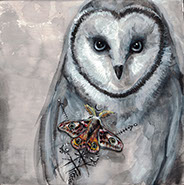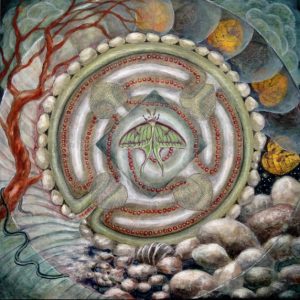 The Yogabliss, Your Heart Life on-line Moving into Meditation classes met this morning. We explored equanimity and compassion. They can work together to help us respond to life’s challenges. Mindfulness helps to work with strong emotions. It offers us tools to moderate the intensity of our feelings. It helps us to respond to ourselves and others with compassion.
The Yogabliss, Your Heart Life on-line Moving into Meditation classes met this morning. We explored equanimity and compassion. They can work together to help us respond to life’s challenges. Mindfulness helps to work with strong emotions. It offers us tools to moderate the intensity of our feelings. It helps us to respond to ourselves and others with compassion.
We drew inspiration from meditation teacher Kate Davies. You can read more of Kate’s insights in her essay, An Equanimous Heart.
We drew on the insights of meditation teacher, Cheri Maples. Cheri served in the criminal justice system for over 25 years. After meeting Zen Master Thich Nhat Hah, she became a meditation teacher and together they introduced mindfulness to the police officers of Madison, Wisconsin. She speaks about balancing compassion with equanimity. She encourages students to train with the small stuff so we’ll be more likely to work with the big stuff.
Today we’ll explore the cultivation of equanimity and compassion. We can think of equanimity as a peaceful heart and a balanced mind. It is not apathy or indifference. Equanimity is being centered in the middle of life’s constant change.
Equanimity is the ability to see with patience and understanding.
Equanimity creates the space in which compassion and love arise. Meditation teacher Kate Davies writes:
Equanimity is about balance and spaciousness.
It’s about holding life’s ten thousand joys and ten thousand sorrows
in the vastness of our hearts.
It’s about welcoming everything and anything,
and accepting it just as it is.
 Let’s find a centered relaxed posture. You can sit on the floor, a chair or recline. I invite you to come into the direct experience of being. Feel your body just as it is. Explore the sensations of weight, temperature, density or lightness. Sense your bones settling downward onto Earth’s body. Tune into the solid and steady support beneath you. Many of us are living with uncertainties, difficult situations beyond our control. And, we can still have this direct experience of something greater that is supporting us.
Let’s find a centered relaxed posture. You can sit on the floor, a chair or recline. I invite you to come into the direct experience of being. Feel your body just as it is. Explore the sensations of weight, temperature, density or lightness. Sense your bones settling downward onto Earth’s body. Tune into the solid and steady support beneath you. Many of us are living with uncertainties, difficult situations beyond our control. And, we can still have this direct experience of something greater that is supporting us.
Meditation teacher Sharon Salzberg speaks of equanimity as a “spacious stillness of mind.” In this space we can remain connected to what’s happening around us while remaining free of our tendencies to grasp at what we want or push away what we don’t want.
We can draw inspiration from an old Tibetan saying:
One hand on the beauty of the world,
One hand on the suffering of all beings,
And two feet grounded in the present moment.
We are here, willing to be present to what is true. We aspire to see clearly and to stay awake. As you continue to feel breathing and body sensations, let there be some space around whatever arises. There are times when we feel heart-sore with a weight of sadness. Tension of anxiety or fear sometimes surfaces during the day or night. These are natural responses to our challenging human conditions. You can bring your attention to whatever’s present in your heart. Can there be room enough for anger, grief, fear or even feeling numb or empty? You might notice the attitude with which you are meeting your experience. What are you saying to yourself about what you are feeling? Can you bring presence and space to the feeling?
 Moving through life with open hearts and clear eyes is often difficult. It takes knowing when to draw on compassion so that we don’t become overwhelmed. In this way compassion is like equanimity’s mirror. Notice what you are feeling with the heart of compassion. If what you’re feeling starts to feel like too much, you can back away a little bit. You can return to the sensations of something more neutral like bringing your awareness to your hands, their coolness or warmth, the heaviness or lightness in your palms and fingers. Move to any direct experience that feels o.k. We’re not avoiding or suppressing strong feeling. We are moderating its intensity, moving toward equanimity with compassion.
Moving through life with open hearts and clear eyes is often difficult. It takes knowing when to draw on compassion so that we don’t become overwhelmed. In this way compassion is like equanimity’s mirror. Notice what you are feeling with the heart of compassion. If what you’re feeling starts to feel like too much, you can back away a little bit. You can return to the sensations of something more neutral like bringing your awareness to your hands, their coolness or warmth, the heaviness or lightness in your palms and fingers. Move to any direct experience that feels o.k. We’re not avoiding or suppressing strong feeling. We are moderating its intensity, moving toward equanimity with compassion.
How do you respond to the invitation to offer yourself compassion? The word itself holds so many elements: awareness and receptivity, acceptance and patience, caring and kindness, sensitivity and tenderness. All of these are deeply human qualities. They can be overwhelmed by the instincts we have to feel safe and secure and by our lifelong conditioning. Take a moment to consider what qualities of compassion resonate with your heart: awareness, receptivity, acceptance, patience, kindness, sensitivity and tenderness. If you can, respond to yourself with compassion right now.
 In mindfulness practice we learn how to respond to the strongest emotions. This is where we learn to have one hand on the beauty of the world, one hand on the suffering of all beings, and two feet grounded in the present moment. Meditation teacher and clinical social worker, Cheri Maples, described the need for balancing compassion with equanimity:
In mindfulness practice we learn how to respond to the strongest emotions. This is where we learn to have one hand on the beauty of the world, one hand on the suffering of all beings, and two feet grounded in the present moment. Meditation teacher and clinical social worker, Cheri Maples, described the need for balancing compassion with equanimity:
Compassion allows us to respond to suffering with a tender heart. But we need to steady ourselves in the midst of our tender heartedness. Without equanimity, compassion can burn with too much passion and it can exhaust us and actually create more suffering. Equanimity allows us to rest in some spaciousness. . . . The training ground for . . . equanimity is to learn to be still amidst the smaller things . . . the small transgressions that take place during the course of our days . . . the traffic jam . . . the lines I have to stand in . . . the pain in my back or my joints. . . .
By opening to all these small moments where aversion and resistance arise . . . we develop the capacity to stay present with greater challenges. By training with the little stuff, we train ourselves with the big stuff.
 Right now, we can reflect on how we respond to the little stuff in our lives. When was the last time small annoyances seemed to add up until you lost your temper? How has your patience been tried? And how did you recover? Were you willing to acknowledge and repair hurt feelings? These mistakes and regrets are the building blocks of compassion. They move us to toward the Perfect Equanimity described by the Sufi poet Hafiz:
Right now, we can reflect on how we respond to the little stuff in our lives. When was the last time small annoyances seemed to add up until you lost your temper? How has your patience been tried? And how did you recover? Were you willing to acknowledge and repair hurt feelings? These mistakes and regrets are the building blocks of compassion. They move us to toward the Perfect Equanimity described by the Sufi poet Hafiz:
Look how a mirror will reflect
with perfect equanimity
all actions before it.
There is no act in this world
that will ever cause the mirror
to look away.
There is no act in this world
that will ever make the mirror
say, ‘no.’
The mirror, like perfect love,
will just keep giving of itself
to all before it …”
May we cultivate equanimity and its mirror of compassion.

